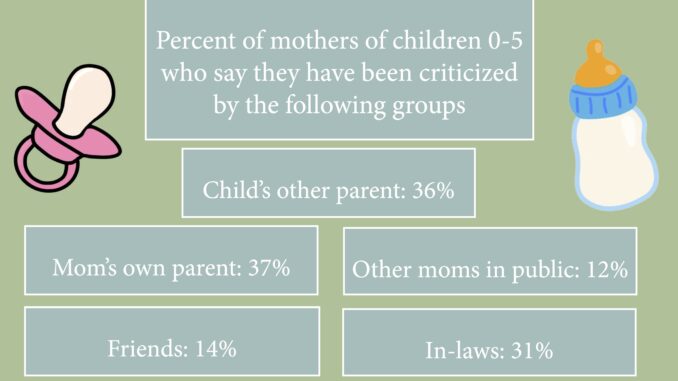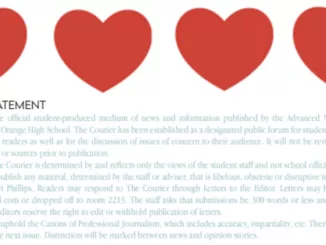
photo credit: Savanna Smith
In real life and in digital spaces, people can see how other mothers parent their children. With this being on display, it makes room for outsiders and their opinions, saying things like “If you’re feeding your baby formula, you’re doing it wrong,” or even blatant eye rolls.
According to Choosing Therapy, mom shaming occurs when someone judges or criticizes a mom for her parenting style or choices. These choices can be how the mother decided to give birth, breastfeeding or even a mother’s appearance.
“Mom shaming is being unnecessarily critical of someone’s parenting; it is not productive. It doesn’t help the mom, parent nor does it help the child,” social studies teacher Brooke Sandy said, mother of five year old Callum and two year old Mateo. “There are constructive ways to bring up concerns about parenting that don’t involve shaming someone. Shaming someone for their choices can be damaging a relationship.”
“Mom-ing” is difficult because there’s always discourse about what is right for children and their development. One popular disagreement is ‘breastmilk or formula’, but it is tough to breastfeed in public when some take offense to it but feeding formula is frowned upon.
“To be honest, I don’t really pay attention to what other people say and when it comes to parenting. I have the benefit of having friends and family members who have kids, so I’ve seen how they’ve done it. I have been able to develop my own kind of parenting philosophy, and I’ve been very flexible with how I’ve done things,” social studies teacher Leslie Hosgood said, mother of two year old Maya and five month old Leela.
“Going back to the breast milk versus formula thing, I’ve done everything for both of my kids, so personally for me I don’t feel that, but I definitely understand women who are in a particular situation where they are feeling a lot of shame and judgment from their in-laws, their parents or friends. I’m lucky that I don’t have to deal with that pressure.”
Sometimes, mom shaming stems from people, commonly other mothers, who believe that their techniques and their opinions are correct and everything someone else is doing is completely wrong. And other times it comes from people who aren’t even parents.
According to Mom Well, toxic mom culture is fueled by societal expectations, social media, information overload and perfectionism. It’s easy to look at other families on social platforms and compare their curated “reality” to a mother’s actual reality. This then creates a negative cycle, making people feel inclined to leave negative comments or judge other mothers.
“It can be damaging to their self-esteem, have an impact on their mental health, making it less likely for them to ask for help,” Sandy said. “It may prevent them from taking their kids out in public and strain relationships. Being ridiculed is not going to make someone a better parent.”
Mom shaming doesn’t only affect the mother, but the children as well, as it can affect their mental state, self-esteem and even make them anxious.
“There are lots of challenges parents face. If they are raising a child who is neurodivergent for example, the challenges are going to be different than a parent who’s not dealing with that,” Hosgood said. “Then you add in sleep deprivation that happens to parents, it’s a recipe for a lot of stress on the parents, which then can affect the children if they are feeling stressed; can shape their interactions like being more quick to yell at a child or to put pressure on them because they think that their child should be doing what they see online or what they see their friends kids doing. It can be detrimental for all parties.”
There are ways to support other mothers without overly criticizing them and without judgment by being encouraging and sharing one’s personal experiences with one another.
“Parents know what is best for their kids. What works for one parent and one child does not mean it is going to work for another parent or another child,” Sandy said. “Do what is best for them and their child and don’t worry about the haters. Parenting is hard, at the end of the day most of us are just trying to do the best for our kids.”


